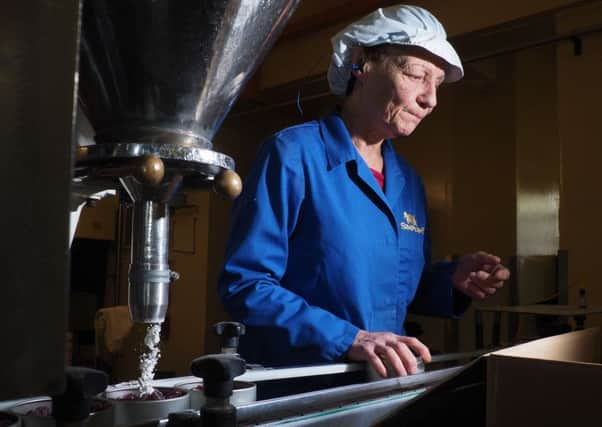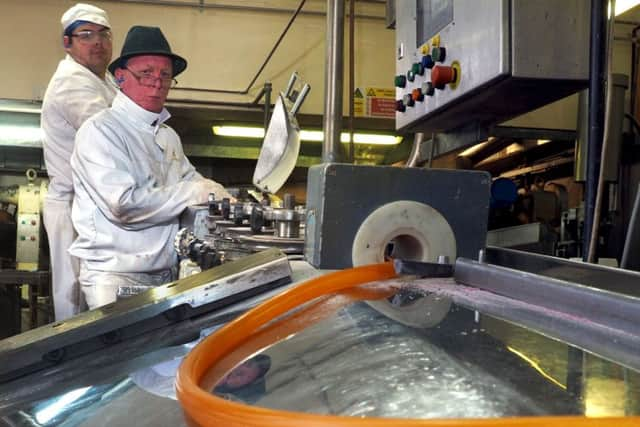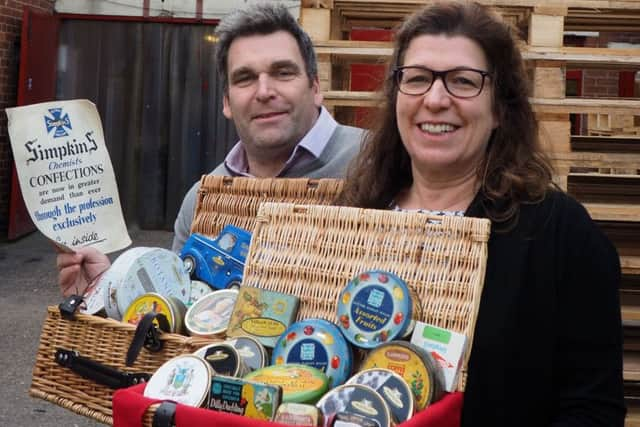Why life remains sweet for Sheffield confectionery firm after 95 years


“We supplied the Australian cricket team with glucose for quite a while, so we probably contributed to a few Ashes defeats for England,” confessed Adrian Simpkin.
“But we also provided high altitude bomber pilots with dextrose during the Second World War. We picked up the recipe at the Leipzig show in 1938, so you could say we started manufacturing dextrose under the noses of the Nazis.”
Advertisement
Hide AdAdvertisement
Hide Ad

And then of course there’s the revelation last week that Margaret Thatcher’s voice control may have been influenced by a secret stash of Nipits.
“We were unaware she was a user,” claimed Adrian of the discovery by the Victoria and Albert Museum that the former prime minster kept a couple of the famous liquorice throat sweets in her jacket pocket. He added carefully: “We have supplied quite a few Royals and other famous people, but we don’t ever say.”
Simpkins have been making throat lozenges, glucose products and sweets for the world since 1921, and their unassuming factory a few minutes from Hillsborough corner is busier than ever, say production line staff. The factory can turn out 20,000 tins containing nearly three quarters of a million sweets every day, said Karen, Adrian’s sister and co-director. Sweets for Concorde, for Everest expeditions, for the Queen of Denmark, the Duke of Gloucester and Led Zeppelin.
Karen and Adrian’s grandfather was injured in the infamous battle for Serre on the Somme which saw hundreds of fellow Sheffield PALS killed. Second Lieutenant Albert Leslie Simpkin returned to the trenches and was wounded again (and later awarded the Military Cross) while leading an attack on a machine gun post in 1918.
Advertisement
Hide AdAdvertisement
Hide Ad

After the war, said grandson Adrian, he was offered liquid glucose after an operation for shrapnel wounds, and noted: “It’s too messy, this, can’t you get it hard-boiled?” Within a year, Albert Leslie had converted a sugar mouse machine at the family grocery shop in Pitsmoor to produce glucose drops for chemists around the UK.
As the company grew and moved to Hillsborough, Albert Leslie began taking world cruises where he’d nip into the local pharmacist and establish customers for generations of Simpkins to come in South Africa, Canada, Australia, New Zealand, Malta, Cyprus and the USA.
“There are slightly different formulations for different countries,” said Karen. “Canada just won’t have green sweets for example.”
Karen and Adrian followed their father John into the company after earlier careers in food technology for Karen and as a Royal Marine for Adrian. “We were never brought up to work here, we were told we had our own lives to lead,” said Karen.
Advertisement
Hide AdAdvertisement
Hide Ad

After an early conversation between Albert Leslie and the sales manager of nearby Bassetts, Simpkins decided to stay out of sweet shops, and sold glucose and menthol drops and then sweets through pharmacies and more recently garages, garden centres and food shops, from Halfords to Harrods.
The travel sweets idea started when a tin of sweets in the glove box came to be seen as a key preparation for journeying in your car: noticeboards in the packing area show tin labels still used that might be as attractive to hipsters today as they were to 1950s motorists: ‘Horseman Berry’, ‘Guardsman Cherry’, ‘Bobby Man Mint’ and ‘Batsman Fruit.’ (Adrian is now also experimenting with ‘artisan’ flavours - elderflower or strawberry and black pepper, for example. Hemp was less successful, he grimaced.)
Larger confectioners are becoming more and more automated, but Karen and Adrian still prefer to have human staff members on board.
“People who run automated production lines say ‘Terminal 236 is not going to be off sick or go on maternity leave’ but I don’t think you get the quality,” said Adrian. “I’d rather have Lorraine stood at the end of the belt to make sure the sweets aren’t malformed.”
Advertisement
Hide AdAdvertisement
Hide Ad

The company is proud of its ‘Made in Sheffield‘ status and Adrian says there are still lots of small companies far away from the digital economy who are the ‘backbone of Sheffield’.
“And we’re still supporting 40 or more families here. We always remember it’s not us who built this company up, it’s that lot in there,” he said, indicating the factory and yard outside. Staff are aways paid above the living wage, he said, “because that’s what you have to have. It’s the living wage.”
At which point lifetime employees Margaret and May Beale called into the office: in their eighties, the former forklift truck driver and sweet packer twins are still given a job at Simpkins, mending overalls. Did they once have a hand in Robert Plant’s blackcurrant drops, Ritchie Benaud’s glucose tablets or Margaret Thatcher’s Nipits? They’re not saying.